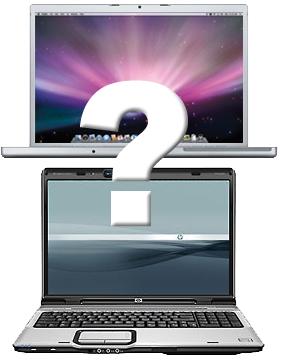I’ve convinced many people to buy a Mac over the years, but there’s one person I cannot convert. My mother refuses to go Mac. To put this in proper context, you should know that she is not a computer novice. She has no problem fixing driver problems or troubleshooting a PC. She runs several web sites. You should also know that she is not hostile to the idea of using a Mac.
So, she’s computer-saavy and open minded about trying the Mac OS. So why doesn’t she buy one?
I have to admit that I was disappointed when she recently purchased an HP Pavilion DV740US laptop for $1149. This model came with a 1.67GHz Centrino Core Duo processor, 3GB DDR2 RAM, Windows Vista Premium, a DVD±RW/CD-RW drive with Blu-Ray read support, a 5-in-1 digital media reader, a 320GB hard drive, a TV tuner and a 17-inch screen. It has a built-in camera and wireless capability. In short, it’s designed to be an full-featured entertainment center. It weights in at 7.7 pounds.
She did take a look at the Mac options, but only considered the MacBook Pro — the 17-inch screen was a minimum requirement. But at a starting price of $1,999, the MacBook Pro was just too expensive. It also didn’t have as many features. For her, the HP model was the obvious choice. The primary user of this machine, my father, is happy with it. What’s he doing with it? Primarily surfing the web and checking emails. While he might not use a lot of the power and features of the HP, he gets a zippy machine with a big keyboard and large screen. And when he’s not using it, my mother has access to a powerful second computer in the house (her primary is a Gateway desktop).
I’ve tried to convince her to buy a Mac for years. My main points on why I feel the Mac is the best choice will be familiar to most readers of this site:
You may pay more upfront for a Mac but it’ll generally last longer. I think that most low-cost PCs are designed to be disposable, and they are generally made with cheap components. My second generation iBook G3, though, is seven years old and still going strong. Macs are generally well-crafted machines. Also note that Windows may be much more expensive than the Mac OS in the long run.
I also believe that the Mac user experience is superior thanks to the OS and the aesthetics of the hardware design (and apparently just thinking about Apple makes one more creative, which is kind of scary).
Next, I say that the extra bells and whistles of entertainment machines like the HP DV740US don’t add up to much. I think the Mac excels at honing in on the essentials that people need while steadfastly avoiding feature bloat. This is just my personal choice, but I’m wary of everything-and-the-kitchen sink PCs. In my experience, the base capabilities may appear to be great, but in reality they just don’t work that well. And they generally don’t work well together. We Mac users like to say that our machines ‘just work.’ Well, that’s because Macs just work.
Security is generally considered to be much stronger on the Mac. The main counter-argument I hear on this point is ‘Sure, but just wait until the Mac gets more popular.’ Actually, I think that’s a valid point. We shouldn’t take our relative security for granted. The Mac OS is fairly secure, but it’s far from perfect. It is, however, vastly more secure than a machine on Windows. I don’t see this changing anytime soon.
I also think that Mac software (both Apple and third-party software) is vastly superior in terms of quality, user experience, and OS integration to what you can get on a PC. This is subjective, I know. But it’s true!
Finally, the Mac is the only platform today that can (legally) run the Mac OS along with Windows and most other operating systems. And Macs Run Windows Vista Better Than PCs according to just-released Popular Mechanics test.
In the end, my arguments lost out. Here were the main points behind her HP decision:
- She would love to try out the Mac OS, but she is quite content with Vista
- The 17-inch screen is a must — and the Mac only offers costly options in this category
- The HP offers many more features for much less money
I have to say that I understand the decision to go with HP, but I think the cost benefit of the cheaper HP will decline over time. I think you get what you pay for. However, I have nothing but anecdotal evidence to back this up. Perhaps the HP will stand the test of time just as well as a Mac, or perhaps it doesn’t matter because it’s cheap enough to be replaced without much concern in two or three years.
Despite the fact that I still haven’t persuaded her to switch, she remains very interested in the Mac OS. She noted that she would like the option to install the Mac OS on a Windows machine so she could test it out. She’s not the only one. This happens to be a current hot topic in the Mac community. For more on this, see the April 17 Macworld article, Frankenmac! What’s in a Mac clone?.
Personally, I would love to have the option to legally install Mac OS X on a PC. In fact, I would be tempted to build my own PC tower if I could run Mac OS X on it. Will Apple ever license the Mac OS to run on non-Apple computers? I doubt it, but then again I never thought I’d see Apple switch to Intel. While I’m interested in installing Mac OS X on non-Apple machines, I fear what this might do to the the OS over time. Apple’s decision to lock the Mac OS to Apple computers no doubt helps to maintain control, security and compatibility.
Of course, Apple could also add more products to their line to compete with low and mid-range PC desktops and laptops. While this would surely increase market share, would this be the beginning of the end of Apple’s distinctive quality? I think it might: these cheaper machines would logically need to integrate cheaper components to get the price down, right?
At any rate, Macs today cost a bit more. And they are not as fully-loaded as many PC offerings out on the market. For your money, you get higher-quality, well-integrated components. You get the only machine that (legally) runs the Mac OS. You get more security. You get better software. And, most importantly, you get the Mac user experience — it’s hard to explain this to PC users, but it’s an experience that is worth the price of admission.

 I’ve convinced many people to buy a Mac over the years, but there’s one person I cannot convert. My mother refuses to go Mac. To put this in proper context, you should know that she is not a computer novice. She has no problem fixing driver problems or troubleshooting a PC. She runs several web sites. You should also know that she is not hostile to the idea of using a Mac.
I’ve convinced many people to buy a Mac over the years, but there’s one person I cannot convert. My mother refuses to go Mac. To put this in proper context, you should know that she is not a computer novice. She has no problem fixing driver problems or troubleshooting a PC. She runs several web sites. You should also know that she is not hostile to the idea of using a Mac.